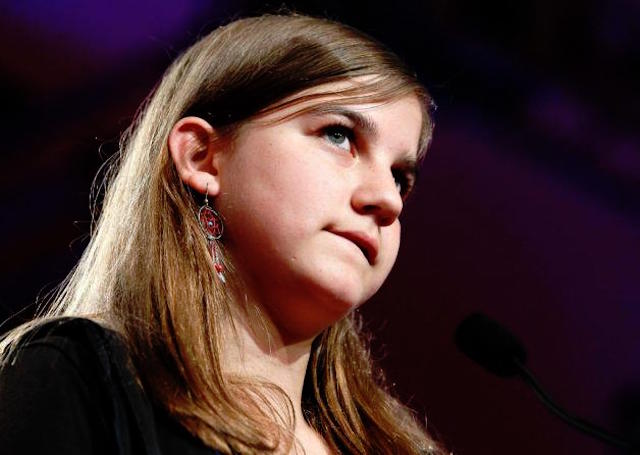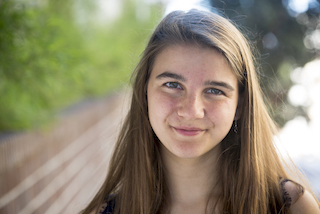A Former Chicago Spelling Champ Takes Us Inside The National Spelling Bee
By Gwendolyn Purdom in Arts & Entertainment on May 26, 2016 6:44PM
Devora Klionsky doesn't trust spell check. It rarely catches things like homonyms or usage errors. Plus, the 18-year-old Hyde Park native doesn't really need the help: in 2010, her life-long spelling prowess took her all the way to Washington, D.C. where she competed in the Scripps National Spelling Bee. The 2016 bee airs on ESPN tonight at 7 p.m., so we caught up with Klionsky—who will return to Chicago in a few weeks after completing her freshman year of college in San Francisco—to get the inside scoop on what the experience was like, why spelling matters, and whether the kids at the bee are as quirky as they seem on TV.

Devora Klionsky in the Spelling Bee in 2010 (Photo courtesy of Klionsky)
How did you get involved in competitive spelling?
I've always been a big reader. People were always asking, "How are you so good at spelling?" I always got the advanced spelling lists or whatever. I won my school's bee in sixth grade and went to regionals and didn't go beyond that. And then I won again in seventh grade, went to the regional bee and then that was that. I went to nationals but I didn't go beyond the preliminaries.
Were you on the TV broadcast?
Yeah, I don't know if there's a link out there somewhere but everyone who goes gets to spell on stage.
So, what word did you spell on stage?
A word that I spelled on stage was "zeitgeber." And I can spell it for you now: z-e-i-t-g-e-b-e-r. It's something that resets an internal time-keeping mechanism.
What word did you get out on?
It's a points system, so it's based on how you do on stage and how you do on a written test, so I didn't spell any words wrong on stage, it was the composite score on the written test.
Do you have a favorite word that you came across?
A word that I spelled wrong on the written part of the test is "wysiwyg," and it's an acronym for What You See Is What You Get. It's a word where if you know what it stands for, you know how to spell it. That was a word that a very small percentage [of kids] got right but then all the parents were like, "Oh, of course we know what that is." Because it was a computer term for their generation. But for all of us it was definitely like, "How would we know what this means?"
They'd pay for your flight and your hotel and you got a meal stipend, and you could stay for the whole week regardless of how far you got in the bee. I think there was something like 270 of us from all of the states as well as a couple different countries and it was totally this [world of] kids all hanging out. It wasn't like, "Mom, can I go to the lobby?" It was like, any hour of the day, we were all staying in the same hotel, so you'd go downstairs, you'd see people with their bee shirts and there was always so much to talk about. It's a bunch of mostly fifth through eighth graders who love to read and write. Any brand of excited or nerdy was celebrated. People were just curious and interested.
Three of my closest friends are people who I met during Bee Week. And I've visited them, they've visited me. We're all in touch still. There are Facebook groups and meet-ups. I think my year might be somewhat unique in that way but I think it's probably somewhat true for most years.
Having seen the spelling bee documentary "Spellbound" and other pop culture representations of the bee, it does get kind of a reputation for having pretty eccentric kids. Would you say that that's the case?
Yeah, for sure. And there's definitely a lot of home-schoolers and other interesting kids, but even the people who "fit the type" don't really fit the type. Some of them you're like "Oh, wow, OK, you're like the kid I would have seen in whatever movie." But no, it's a bunch of interesting kids who are excited to be there and sure, eccentric, but if it has a negative connotation then I wouldn't say so. Definitely diverse and interesting.

Devora Klionsky, now 18 (Photo courtesy of Klionsky)
I know people who studied really hard, people who studied Latin and Greek roots, people who had coaches, people who did all this stuff. They give you a couple pretty extensive word lists to study from, I knew those back and front but I didn't really go beyond that. I felt like it was already beyond where I thought that I'd get and I wasn't really like, "I'm gonna win this thing!"
Has having been in the spelling bee impacted you later in life?
It comes up all the time. People are always like "Did you win?!" Definitely didn't win. And then they'll say, "Oh, that's so cool" or "That's so nerdy." Or usually people give me a word to spell. Just classic words that people think of as "difficult words." Like, "Can you spell antidisestablishmentarianism?" Yeah, of course I can. So can you, probably, if you think about it.
In the time of spell check, why would you argue knowing how to spell is an important skill to have?
People are always saying, "Well, isn't it just memorization?" Maybe some people do it that way, maybe some people read the dictionary and have incredible memories but I find that even if it looks like just memorization, just these kids who can rattle off crazy long words, most of them know something about the roots, or something about the definition, or something about the part of speech. You're not just learning spelling for the sake of spelling. You're also learning a ton about language and a ton about learning also, I think. People figure out what works for them.
If you see misspelled words now, does that bother you?
I can't let them sit. I have to change it. I don't care if people are bad spellers, but if they send me something, it definitely doesn't go unnoticed if it's a word that I know.
This interview has been edited for space and clarity.